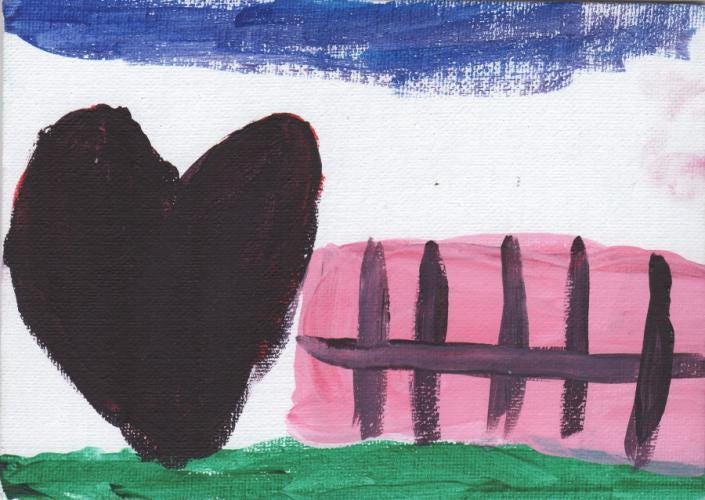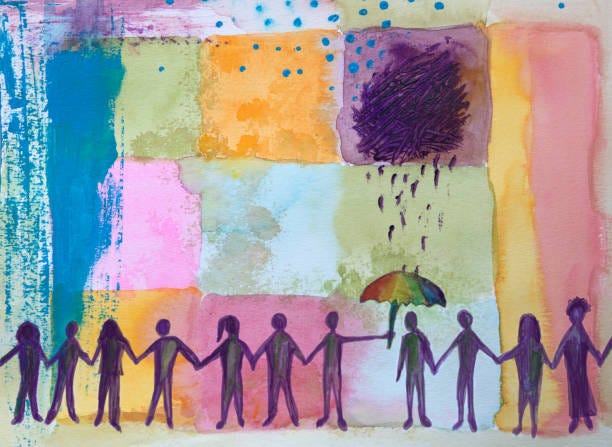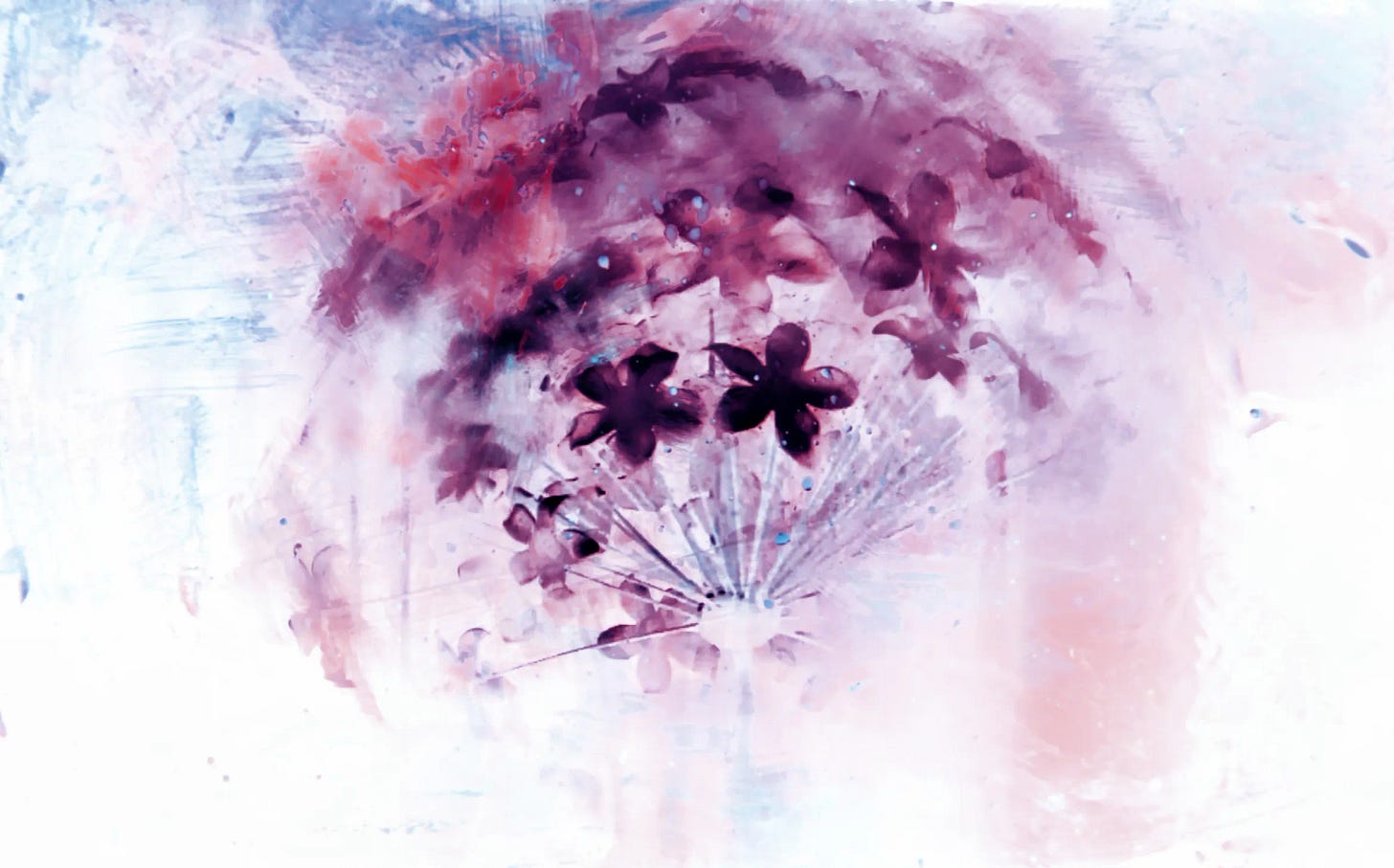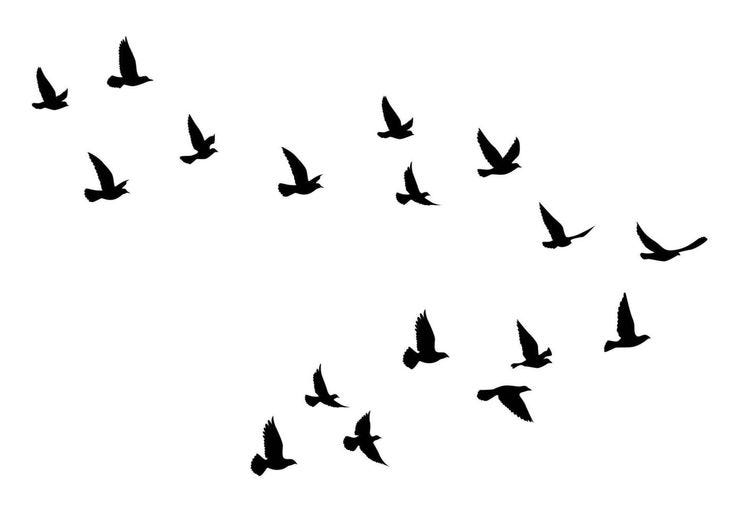How to Throw a Grief Party
What's the code of conduct for a grief party? Our friends Ruhi and Uday taught us a few lessons in how to meet and greet grief.
Gut as brain
At 2.35 am, I got added to a WhatsApp group called Celebrating Uday. It was an invitation to participate in a venture for which I had no life experience, no response mechanism, not even a set of good manners.
Ruhi’s message was straightforward, borderline abrupt.
‘I want to share a meal and raise a toast where we can all bring our favourite Uday story.
Today: Lunch. 1 pm onward.
Don’t have the stamina to figure out food and drinks. Can we do a potluck?
Venue: My place. Bring crockery and cutlery. I may not have enough.’
Ruhi was asking 20 friends of her husband to organize a lunch for him, eight hours after his cremation.
15 thumbs went up immediately in the group. A few flowers – pink and yellow with olive leaves- popped up like embroidery in the window. Shorthand for, ‘Sorry we can’t make it’. The others typed ‘OK’ – to mark attendance and compliance.
But there was a hum in the group immediately. 20 people in 20 locations across the National Capital Region (NCR) jumped into this web of pre-dawn chit-chat. We were seeking asylum and safety in each other, lest grief find us alone, and shatter us to pieces.
We pulled up Excel sheets and checkboxes in our heads. A sub-committee was appointed to create the playlist. The draft menu popped up. A few chuckles erupted on the proposed fusion desert. From standing silently for hours at the crematorium, we were finally loosening up and chatting with each other. The relay of familiar, simple tasks began to nudge us out of our black holes of shock.
Suddenly a small squabble broke out on a parallel thread. The disciples of the Beatles started arguing with the Rolling Stones fans about the choice of songs in the playlist. Uday’s music was his politics. The playlist would have to be representational.
We were warming up to a good fight when Ruhi mediated sharply. ‘Let's not quarrel,’ she messaged. She was not ready yet, for regular banter.
From then on, the night crawled with caution on the WA group. 20 acquaintances held by a thread of shared pain, tread on their words like they were eggshells and glass. We scrubbed out our tone, and sanitized every phrase, lest our comments upset Ruhi, again.
Ruhi’s idea of a party had jolted my brain like the chocolate bomb of a childhood Diwali. A tiny ball of gunpowder masquerading as chocolate in cheap shining paper had blown up Bahadur, our watchman’s palm. I was six then. My head had shut down for days with the shock.
That night, my adult brain, responded differently to the shock of organizing a party for a friend who had died in his sleep 24 hours back. My head and stomach startled, jumped about in confusion, and exchanged places. My gut became my brain and instructed me to go forth with the party plans, even if I lacked the energy and proper manners to meet and greet grief.
Code of conduct
I should have been less picky about the size, curve, and glint of the copper urn. But I went from shop to shop to shop along the lengthy row of Dashakarma Bhandars in C.R Park, dredging through the thousands of items they stocked for the ten key life rituals of believing Hindus.
Uday was not a believer, but his brother wanted to light his pyre with a semblance of rituals.
After inspecting 20 urns, I found the vessel that Ruhi would approve. It was modern, unlike the traditional rotund lotas, with the neck of a swan, and delicate straight lines etched on its rim, swell, and base.
“Hurry up! You are not purchasing a birthday gift!” my partner hissed. “This need not be perfect.”
Perfectionism opens up many landmines. My perfect purchase led to awful delays.
By the time I reached the crematorium, the rites were done, Uday had been consigned, and the furnace was at work. Shock and silence boxed in the air of the cremation ground, squeezing out oxygen, and making it impossible for anyone to breathe.
“Latecomer to the funeral,” Ruhi mocked, in her trademark teasing way. “But no worries, the urn won't be needed before a couple of hours.”
“Yeah, at least the urn is on time,” I murmured and judged myself for poor cremation small talk.
Ruhi went back to mingling among the mourners, accepting condolences, nodding, smiling, checking if the elderly needed water, organizing a chair for her broken brother-in-law to sit, swallowing the warm obituaries of Uday from the steady trickle of visitors, and taking breaks to pop pills for her migraine.
In some distance, 20 friends - some had flown in from other cities - stood in small huddles, staring at the ground, unable to meet Ruhi’s eyes. We were vacant, in a draught of words and emotions, like small pebbles scattered in a large, dry pool.
At one point Ruhi looked up at the sky. Our eyes went up too. 20 parakeets were circling above our heads, around the smoke from the chimney of the furnace. “There’s Uday, as smoke, flying with the birds,” Ruhi said.
This was straight-out morbid. I wanted to look away, but a joke popped out of my gut. “Is Uday singing Smoke Gets In Your Eyes, to those birds in his off-note voice?” I blurted.
Shit!
“Is he burning up the eyes of those birds?” another out-of-control friend piped in.
Double shit!
“Someone save those birds. Uday is torturing them as he tortured us,” a third jumped in.
The longest ten seconds of silence followed. And then, Ruhi’s face crinkled before she half covered them with her hands and caved into a huge laugh. The relatives started sputtering and chortling; the elderly allowed grins to cut through their faces. A few broke into loud chuckles.
It was impossible to not crack up at the thought of Uday’s goof-ups. He was a natural comic, who could inflict death by laughter with his terse comments, naïve barbs, and not-so-great crooning.
Uday’s reticent brother moved from the margins to the center of our huddle. “I can’t forget the night Uday snored to the high heavens at the Annapurna Base Camp. The climbers could have murdered him that day!”
We broke into a roar.
On his cremation day, Uday gave us permission to have a bit of a party. To show up late, be trivial, spar a little, shoot stupid repartees, feel out-of-place, crack poor jokes.
In the absence of a code of conduct for grief, he showed us that we could practice ordinariness, be regular, and hold on to our mundane selves, even as we fought for breath in the airless trenches of sorrow.
Grief has no templates
We ran out of chilled beer. There was too much food, or perhaps no one with an appetite.
Ruhi and her 14-year-old, Ira, were moving from room to room, filling up the snacks station with chaat and kababs, breaking down, retreating into silence, giggling at the silly anecdotes on Uday.
The October light had turned their home golden. The music was booming. We were smiling and sobbing with it.
The relatives were a sport, even if they showed up with aghast faces. “A party in less than 24 hours…that’s very forward,” Ruhi’s elderly landlord commented. He hung out with us and had a mint nimbu paani.
A bunch of friends were laughing hysterically at the fox that sat in the center of Uday’s childhood family portrait. Uday’s brother was regaling them with the story.
Many years ago, Uday’s family lived in Chaibasa, by the rim of the dense Saranda forests, on the campus of a giant public sector company. The caretakers of Uday’s home had mistaken this fox pup for a dog. They. The entire family had fallen in love with this pet of mistaken identity. They raised it with full dedication, till the day the guards discovered that he was the murderer of all the chickens on the campus. Uday’s dad decided to not abandon the fox, but let it out into the open in the woods in the backyard. They took care of it, till it disappeared into the jungles.
“Only your family could have mistaken a fox for a dog and raised it as a pet for years,” I quipped to Uday’s brother. “Now I am the only one left of this family,” he quipped back.
Grief: A doorway to growth
That afternoon we carried on, as organizers and guests of the most difficult party of our lives, expecting Uday to emerge any moment from the kitchen with his goofy grin, platefuls of food, and stash of jokes.
It was a day of many permissions.
Grief gave Ruhi the courage and permission to ditch the traditional templates, schedules, and protocols for grieving and facing death.
Grief gave us the permission to renew our friendships that had been coarsened by life.
And we gave ourselves the permission to see grief as a doorway to growth.
I wrote this essay at an Workshop to the prompt ‘Permission’.
A few weeks later I shared it with Ruhi with great trepidation. Would these words hurt her? Would she feel judged? Would this essay dent our friendship?
Ruhi responded with a Whatsapp message: ‘Reading this essay made me realize that throwing a celebration party for Uday was an act of courage. I felt proud.’ She gave me permission to release this essay into the world.
This essay is my ode to Ruhi and Ira who navigate grief everyday as a portal to growth.
(All names have been changed in this essay. Everything else is exactly as I remember.)










Manisha, your writing always offers me the gift of emotional release. More power to you, my friend, to face challenges with goofy blurting that is both ill-timed and timely! Beautiful writing!
What a piece of writing! And how brave is this friend of yours. 🫂